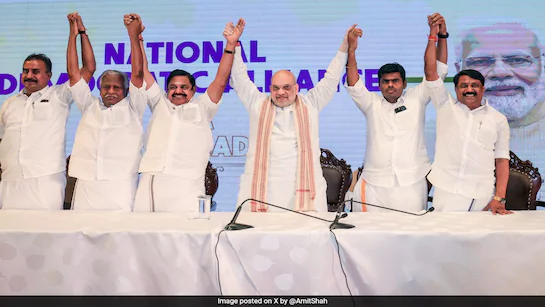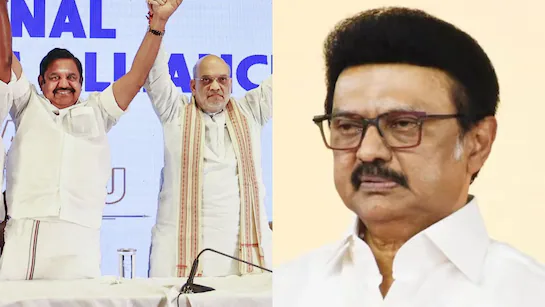BJP-AIADMK Alliance: Preparations for the 2026 Tamil Nadu Assembly elections are heating up, and the political landscape is buzzing with new alliances, shifting strategies, and revived rivalries. While DMK and AIADMK have long dominated the state’s Dravidian-driven political arena, BJP’s persistence and recent alliance rekindling with AIADMK are injecting new energy into the race.
This strategic coalition might seem like a strong front, but under the surface lies a web of internal politics, ideological mismatches, and tactical compromises.
Here’s a deep dive into what’s unfolding –
Table of Contents
BJP’s Tamil Nadu Puzzle: Between Dravidian Legacy and National Identity
Tamil Nadu politics is deeply rooted in Dravidian ideology. Parties like DMK and AIADMK have thrived by championing Tamil pride, language, social justice, and regional identity. National parties like the BJP have struggled to strike a chord with the electorate, often seen as distant or disconnected from local sentiments.
While BJP has managed to build a loyal vote bank across many Indian states, Tamil Nadu remains a tough terrain. The party is often seen here as culturally alien—focused on North Indian, Hindi-Hindu centric narratives. This perception has made it difficult for BJP to penetrate the traditional DMK-AIADMK strongholds.
But the saffron party is not stepping back. With the 2024 Lok Sabha results showing modest growth in vote share but no seats, BJP is rethinking its approach—choosing pragmatism over pride.
The Tactical Shift: BJP’s New Narrative on Panchayat Empowerment
One of the most significant strategic shifts from the BJP has been its new focus on local governance—an area often overlooked by both DMK and AIADMK.
Key Components of BJP’s Local Push:
- Village-Level Report Cards: Creating performance evaluations of panchayats to highlight local neglect.
- Panchayat Manifesto: Launching a dedicated rural manifesto for 2026.
- Padyatra Campaigns: Taking the ground route, walking through villages to interact with citizens directly.
The idea is to appeal to voters not through nationalistic slogans but by talking about what matters—roads, water, jobs, schools, and the empowerment of local governance bodies.
BJP wants to brand itself as a party that decentralizes power and brings development to the grassroots, painting DMK as a centralized, power-hoarding party.

The Political Marriage: Why AIADMK and BJP Reunited
Despite tensions, the BJP and AIADMK have decided to walk together again. The alliance is not just political—it’s strategic survival.
Why AIADMK Needs BJP:
- Post-Jayalalithaa Decline: AIADMK lost its charismatic leader and is still recovering.
- Resource Support: BJP, being in power at the Centre, has deep pockets and administrative clout.
- Common Enemy: Both parties are desperate to unseat DMK, and unity is the best way forward.
Why BJP Needs AIADMK:
- Local Muscle: BJP lacks a widespread grassroots cadre in Tamil Nadu.
- Vote Share Synergy: Fighting alone splits the anti-DMK votes.
- Realistic Gains: With AIADMK’s backing, BJP can aspire to win more seats.
The Fragile Coalition: Conditions and Compromises
The alliance came with conditions that reveal the fragility beneath the surface.
- Chief Minister Candidate: AIADMK’s EPS will be projected as CM. BJP agreed.
- Non-Interference Clause: BJP has promised not to interfere in AIADMK’s internal matters.
- Leadership Change: BJP replaced its Tamil Nadu chief K. Annamalai—who was vocal against AIADMK—with a more alliance-friendly face.
Internal Faultlines: Challenges Ahead
1. Worker-Level Coordination
The tension between the cadres of both parties runs deep. Annamalai’s earlier confrontations still leave a bitter aftertaste. Reconciliation efforts are underway, but the grassroots synergy remains weak.
2. Ideological Mismatch
AIADMK’s secular, Tamil-first politics doesn’t naturally align with BJP’s Hindutva narrative. Key policy areas like NEET and Waqf laws could become conflict zones.
3. Minority Backlash
AIADMK’s alliance with BJP could alienate Muslim and Christian voters, especially with Vijay’s new party (TVK) targeting the same demographics.
4. Annamalai Factor
While removed, Annamalai’s loyal supporters in the BJP might not support the alliance wholeheartedly. This internal rift could undermine campaign cohesion.
5. Trust Deficit
Some in AIADMK suspect BJP of long-term plans to subsume the party. Clear communication and defined roles are crucial to building mutual trust.
Emergence of New Players: Disrupting the Game
Actor Vijay’s TVK
With a fresh, clean image and appeal among youth, Vijay’s party is the wildcard. His Christian background and anti-establishment tone may attract minority and urban votes.
Other Smaller Parties
- PMK is likely to join BJP-AIADMK
- AMMK and NTK are exploring options
These additional players may bring seats and vote shares, but also add complexity to alliance dynamics.
The 2026 Prediction: DMK’s Toughest Battle Yet?
With BJP-AIADMK teaming up again, the 2026 elections are shaping up to be a tight contest.
- DMK’s Defence Strategy: Expect strong Tamil identity campaigns and targeting BJP’s “outsider” image.
- Alliance’s Counter Strategy: Focus on local development, empowerment of panchayats, and a unified anti-DMK message.
DMK’s dominance will be challenged not just by the alliance, but also by changing public priorities, caste calculations, and youth discontent.
Takeaways:
- BJP-AIADMK alliance marks a tactical shift, not just a political one.
- BJP is positioning itself as the party for local empowerment.
- Alliance success depends on coordination, clear messaging, and trust-building.
- DMK remains strong but faces its toughest competition in years.
- Vijay’s entry adds an unpredictable element that could change the vote dynamics.
ByNews-Views: Alliance vs Allegiance
The BJP-AIADMK alliance has dramatically reshaped the chessboard of Tamil Nadu politics. What seemed like a bipolar battle now appears to be a multi-player contest filled with shifting alliances and unexpected twists. Whether this new coalition can crack the DMK fortress will depend not just on speeches and slogans, but on authentic engagement, grassroots planning, and narrative control.
The countdown to 2026 has begun—and Tamil Nadu is watching. Tamil Nadu’s voters are in for one of the most unpredictable, high-stakes elections in recent memory.
Also read:

